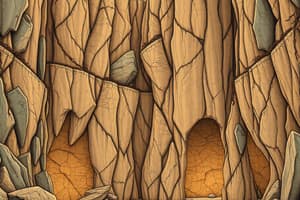Podcast
Questions and Answers
What is Historical Geology?
What is Historical Geology?
- The study of tunnel design
- The study of rock layers
- The study of earthquakes
- The study of changes to earth and life in time and space (correct)
What is relative time in Historical Geology?
What is relative time in Historical Geology?
- The measurement of time using actual numbers
- The measurement of time using radioactive dating
- The measurement of time using comparison methods (correct)
- The measurement of time based on half-life
Which process involves the breaking down of atoms to form different isotopes or elements?
Which process involves the breaking down of atoms to form different isotopes or elements?
- Half-life
- Faulting
- Rock layers analysis
- Radioactive dating (correct)
What type of particles are given off during the process of radioactive decay?
What type of particles are given off during the process of radioactive decay?
What is the most common form of radioactive dating technique mentioned in the text?
What is the most common form of radioactive dating technique mentioned in the text?
What does the term 'half-life' refer to in radioactive dating?
What does the term 'half-life' refer to in radioactive dating?
Which dating method involves the decay of Uranium-235 into Lead-207?
Which dating method involves the decay of Uranium-235 into Lead-207?
Who originally proposed the theory of uniformitarianism in 1785?
Who originally proposed the theory of uniformitarianism in 1785?
According to the theory of uniformitarianism, what is the key to understanding the past?
According to the theory of uniformitarianism, what is the key to understanding the past?
What does Lyell's uniformitarianism propose regarding 'Uniformity of law'?
What does Lyell's uniformitarianism propose regarding 'Uniformity of law'?
Which dating method involves the decay of Rubidium-87 into Strontium-87?
Which dating method involves the decay of Rubidium-87 into Strontium-87?
What does 'The present is the key to the past' refer to in the context of historical geology?
What does 'The present is the key to the past' refer to in the context of historical geology?
What is the main difference between rocks and soils?
What is the main difference between rocks and soils?
Which branch of geology focuses on the form and internal structure of rocks?
Which branch of geology focuses on the form and internal structure of rocks?
What is the main component of highly organic soil?
What is the main component of highly organic soil?
Which geology discipline is concerned with rock successions and their interpretation in terms of time?
Which geology discipline is concerned with rock successions and their interpretation in terms of time?
What is the key focus of economic geology?
What is the key focus of economic geology?
Which field has applied the principles of stratigraphy?
Which field has applied the principles of stratigraphy?
What is the primary focus of engineering geology?
What is the primary focus of engineering geology?
Which subdiscipline of geological engineering uses principles of soil and rock mechanics?
Which subdiscipline of geological engineering uses principles of soil and rock mechanics?
What does rock mechanics primarily study?
What does rock mechanics primarily study?
What gives pearly minerals a luster reminiscent of pearls?
What gives pearly minerals a luster reminiscent of pearls?
Which discipline applies geology, soil mechanics, and structural engineering to foundation design?
Which discipline applies geology, soil mechanics, and structural engineering to foundation design?
What is the main objective of geotechnical engineering?
What is the main objective of geotechnical engineering?
Which type of luster appears to be covered with a layer of oil?
Which type of luster appears to be covered with a layer of oil?
Which area of civil engineering involves the study of paleontology?
Which area of civil engineering involves the study of paleontology?
What is the characteristic of minerals with a vitreous luster?
What is the characteristic of minerals with a vitreous luster?
On the Mohs scale of hardness, what does the level of difficulty with which a smooth surface of a mineral specimen may be scratched indicate?
On the Mohs scale of hardness, what does the level of difficulty with which a smooth surface of a mineral specimen may be scratched indicate?
What does cleavage refer to in minerals?
What does cleavage refer to in minerals?
What quality does 'Perfect' cleavage refer to?
What quality does 'Perfect' cleavage refer to?
Flashcards are hidden until you start studying
Study Notes
- Soils are unconsolidated materials made up of disintegrated rock types.
- Soils consist of minerals, organic matter, gases, liquids, and various organisms.
- Structural geology is the branch of geology dealing with the form and arrangement of rocks and their description and analysis.
- Stratigraphy is the scientific discipline concerned with the description of rock successions and their interpretation in terms of a general time scale.
- Engineering geology applies geologic information to aid in the design of suitable foundations for structures.
- Historical geology is the study of changes to the earth and life in time and space.
- There are two types of ages in historical geology: relative time (historical) and absolute time (actual numbers).
- Uniformitarianism is a fundamental theory in historical geology which suggests the landscape developed over long periods through slow processes.
- Catastrophism is a contrasting theory which suggests geologic events can occur rapidly and dramatically.
- Luster is a property of minerals referring to the way they reflect light.
- Hardness is a measure of a mineral's resistance to being scratched.
- Cleavage is the tendency of minerals to split along definite planes.
- The Mohs scale of hardness is a standardized method for measuring mineral hardness.
Studying That Suits You
Use AI to generate personalized quizzes and flashcards to suit your learning preferences.




